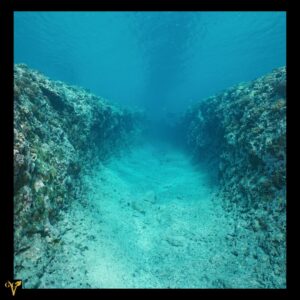Fishing is a massive industry and one that needs to be reeled in! So how would going vegan stop the overfishing impact on ocean ecosystems?

In the post The Perils of the Fish-Farming Industry I talked about the cruel and unhealthy methods of farming fish. I should have added that a lot of food fed to these fish is sourced from the ocean. Herring, sardines, anchovies and the like are captured and, along with ingredients like corn, soy, poultry (yes), wheat and canola, are turned into pellets and distributed as food.
These small fish are vital food for larger marine life, and as we deplete them, we’re impacting the populations of the other fish caught for our tables.
Some may wonder how veganism and avoiding seafood could benefit marine ecosystems and ocean life. Well, the impacts of industrial fishing and aquaculture on our oceans are enormous, threatening countless marine species. Commercial fishing depletes wild fish populations at unsustainable rates through destructive and nonselective gear and techniques.
We all know there are vast industrial fishing fleets in our oceans. They use technologies like purse seines, bottom trawls and longlines to efficiently scan the oceans and catch as many fish as possible quickly, with little regard for sustainability.
Now it’s all very well for these large vessels to go hunting for specific types of fish, but sadly, along with the targets, many other marine fish and mammals are caught up in the nets. This is called ‘bycatch’, and there are different statistics worldwide. For example, the bycatch can range from every pound of fish caught for human consumption up to 5 pounds of bycatch. Here in Aotearoa, N.Z., the rate is less (well, what is recorded), and it’s approximately for every 1 kg (2lbs) to 0.2 (0.4lbs) kg bycatch.
Usually, the unwanted is thrown back dead or dying. This bycatch includes threatened and endangered species like sharks, sea turtles, seabirds and marine mammals that become entangled in nets and on hooks. Even juvenile fish of desired commercial species are frequently caught as bycatch and do not survive to reproduce.
This unsustainable extraction of biomass from the ocean, combined with the massive bycatch mortality, is pushing numerous fish populations to the brink of collapse. By shifting to a plant-based diet that avoids fish and seafood altogether, we can help reduce the excessive fishing pressure and bycatch, allowing threatened marine species a chance to recover and restore balance to fragile ocean ecosystems. Going vegan is one of the most impactful choices individuals can make to help combat overfishing and preserve marine biodiversity.
Some commercial fishing methods (as mentioned above) involve heavy gear that physically destroys vulnerable marine habitats. Trawl nets dragged along the sea floor tear up and uproot delicate ecosystems like coral reefs and seagrass meadows, leaving behind barren patches. These reefs and seagrasses provide critical refuge and nurseries for juvenile fish and invertebrates. This devastating habitat destruction ultimately impacts the entire ocean food web.

Then there is the pollution the fishing industry causes. Granted, they’re not the only vessels plying our oceans – container ships are another player in the pollution game.
But fishing vessels are responsible for the majority of plastic waste and pollution, all from gear that is lost, abandoned or improperly disposed of at sea. Nets, lines, traps and buoys become “ghost gear” that continues to entangle and kill marine life for years as it breaks down into microplastics.
Studies show that fishing vessels lose around 2% of their gear yearly. Around 740,000 kilometres of line each year – that amount could circle the globe more than 18 times! Then there are all the hooks (about 14 billion!) and netting.
The plastic attributed to the fishing industry is over 10% of the plastic waste polluting the marine environment. Derelict fishing gear also damages and degrades fragile habitats like coral reefs. The leaching chemicals from abandoned gear further pollute oceans already stressed by rising plastic levels and warming waters.
We’ve all seen videos of orcas, whales, dolphins, turtles and other marine life tangled in lines and nets and the wonderful humans who cut them free. But they are just the tip of the iceberg.
So how can being vegan stop the overfishing impact on ocean ecosystems?
Being vegan means we remove all seafood from our plates. That includes shellfish, lobsters, squid and octopus as well as fish. Doing this will lessen the economic incentive for fisheries to employ these destructive practices at such an industrial scale. With less fishing pressure on depleted stocks, there is more opportunity for damaged marine habitats to recover. The cumulative impact of many individuals choosing veganism is significant.
When fewer marine animals are caught and killed for food, more remain alive in the ocean to play vital roles in marine ecosystems. This includes species like plankton, krill and jellyfish that support the entire ocean food web. Choosing a vegan diet, we help create a healthier ocean rich in biodiversity.
By voting with our forks, we send a message that we value healthy oceans and the myriad of marine creatures that depend on delicate ocean habitats for survival.
Until next time…









0 Comments